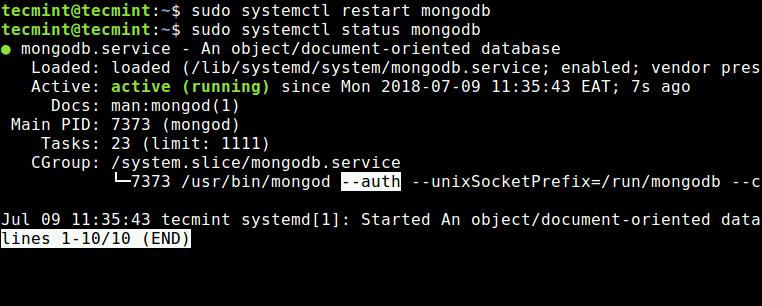

- MONGODB SERVICE START ON LINUX INSTALL
- MONGODB SERVICE START ON LINUX UPDATE
- MONGODB SERVICE START ON LINUX FULL
- MONGODB SERVICE START ON LINUX PASSWORD
Start the MongoDB service on CentOS 8 systemctl start mongod. The value “1” in ok field indicates that the server is working properly with no errors. To make sure the MongoDB service gets started automatically whenever it crashed system the gets rebooted or booted use the below commands: systemctl enable mongod 8.
MONGODB SERVICE START ON LINUX PASSWORD
Next, create an admin user and set a password with the following. Once you are connected, create a database named admin using the following command: use admin. First, connect to the MongoDB instance with the following command: mongo. Go through the following command: $ mongo -eval 'db.runCommand()' Next, you will need to create an admin user to manage the MongoDB databases. Step 4: Now check if the installation process is done correctly and everything is working fine. The last is Ubuntu 14.04 LTS, where the init process is managed by Upstart proprietary of. Systemctl verifies that MongoDB server is up and running. MongoDB just supports versions of Ubuntu Long Term Support (LTS). Step 3: Check the service status for MongoDB with the help of following command: $ sudo systemctl status mongodb Type the following command and press Enter.
MONGODB SERVICE START ON LINUX INSTALL
Step 2: Now, install the MongoDB package using ‘apt’. Type the following command in your terminal and then press Enter. sudo ls -al /etc/init.d/ grep mongod returns nothing. But Debian supplies its own service definitions, and on Debian the service is named mongodb. mongod is the service name used in the service definitions provided by the MongoDB developers. The service is not named mongod on Debian in any case.
MONGODB SERVICE START ON LINUX UPDATE
Step 1: First you need to update and upgrade your system repository in order to install MongoDB. When I type: sudo update-rc.d mongod enable. Follow the steps given below to install MongoDB: These commands are easy to run on the terminal and make the installation process handy. MongoDB can be installed on Ubuntu with the use of the following commands.


See 'systemctl status rvice' and 'journalctl -xn' for details. Now when I'm doing: sudo service mongod start, I'm getting this error: Starting mongod (via systemctl): Job for rvice failed.
MONGODB SERVICE START ON LINUX FULL

Issue this following command: cp -aRp /var/lib/mongo/ /home//mongodb_backupĪnd wait for it to complete. As MongoDB is not running, you cannot use mongodump to back up the data, and you will need to use cp command. The first step you need to do is to back up the MongoDB data as you will need to remove MongoDB Community completely.


 0 kommentar(er)
0 kommentar(er)
